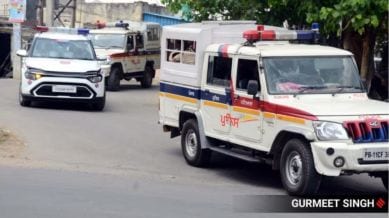Stay updated with the latest - Click here to follow us on Instagram
Five Punjab ex-cops get life sentence for killing 7 in 1993 fake encounters
Citing age, CBI court stops short of awarding capital punishment, imposes `3.5 lakh fine on each

A CBI special court in Mohali Monday stopped short of awarding capital punishment as it sentenced Punjab’s five retired police officers to rigorous life imprisonment for killing seven persons, including three special police officers, in fake encounters in 1993, and described their conduct as “not only unlawful, but also morally bankrupt and profoundly inhumane”.
The court of CBI Special Judge Baljinder Singh Sra also imposed a fine of Rs 3.50 lakh on each of the convicts, ordering that the amount be paid to the legal heirs of the victims.
monthly limit of free stories.
with an Express account.
“Upon consideration of the rival contentions, this court is of the view that there is no doubt regarding the sheer venality and callousness with which the convicts acted, reflecting an utter disregard for human dignity and life. Their conduct was not only unlawful, it was morally bankrupt and profoundly inhumane. However, in view of their advanced age and the prolonged agony endured during the course of the trial over many years, this court refrains from awarding the capital punishment,” the court said.
The court on August 1 had held the five retired police officers —the then deputy superintendent of police Bhupinderjit Singh (61), who later retired as SSP; the then assistant sub-inspector Devinder Singh (58), who retired as DSP; the then assistant sub-inspector Gulbarg Singh (72), the then Inspector Suba Singh (83) and the then ASI Raghbir Singh (63) — guilty of criminal conspiracy, fabrication of records, murder and destruction of evidence under relevant sections of the Indian Penal Code.
Five other accused in the case — the then Inspector Gurdev Singh, the then sub-inspector Gian Chand, then ASI Jagir Singh and then head constables Mohinder Singh and Aroor Singh — passed away during the trial, while one turned prosecution witness.
The court, in its order said that Dr B R Ambedkar, the chief architect of the Indian Constitution, once said, “Rights are protected not by laws but by the social and moral conscience of society”. Regrettably, this moral consciousness has yet to be fully absorbed and reflected in the institutions of governance entrusted with the protection of people’s rights, read the order.
The case stems from two separate alleged fake encounters in June and July 1993. As per the CBI, which was handed over the probe following a Supreme Court order, a police team led by the then station house officer of Sarhali police station Gurdev Singh picked up SPOs Shinder Singh, Desa Singh, Sukhdev Singh and two others — Balkar Singh and Daljit Singh — from the residence of a government contractor on June 27, 1993. All of them were residents of Rani Vallah village in Tarn Taran. They were taken to Sarhali police station and were falsely implicated in a robbery case, as per the CBI probe.
On July 2, 1993, the Sarhali police registered a case against Shinder Singh, Desa Singh and Sukhdev Singh, claiming that they had absconded along with government-issued weapons. On July 12, 1993, a police team led by the then DSP Bhupinderjit Singh and then Inspector Gurdev Singh claimed that while escorting one Mangal Singh to Gharka village for a recovery in the dacoity case, they were attacked by militants. In the crossfire, Mangal Singh, Desa Singh, Shinder Singh and Balkar Singh were killed, police had claimed.
The forensic analysis, however, revealed inconsistencies. It was found that the bullet casings collected from the scene did not match the weapons allegedly recovered from the deceased. Post-mortem examination reports also indicated that the victims had been tortured prior to death. Despite being identified by two ASIs, the bodies were cremated as “unclaimed” and “unidentified”, as per CBI investigation.
On July 28, 1993, three more persons Sukhdev Singh, Sarabjit Singh and Harvinder Singh were killed in a staged encounter involving a police team, also led by the then DSP Bhupinderjit Singh, according to the CBI investigation.
The case came to light as part of the broader investigation into mass cremations of unclaimed bodies in Punjab during the militancy era, spearheaded by rights activist Jaswant Singh Khalra.
Following Supreme Court orders on December 12, 1996, the CBI began its inquiry and registered the case in 1999 based on the complaint of Narinder Kaur, the wife of Shinder Singh.
The CBI filed a chargesheet in 2002 against 11 accused officers. The trial was delayed due to legal stays between 2010 and 2021. Out of 67 witnesses cited by the CBI, 36 died during the trial, while 28 testified. —With PTI